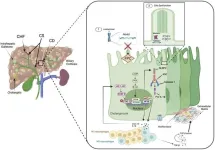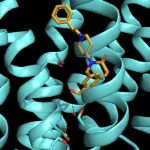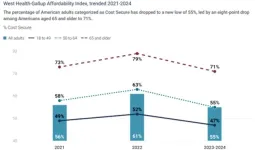(Press-News.org) A new study shows that about two percent of the population develop autoantibodies against type 1 interferons, mostly later in life. This makes individuals more susceptible to viral diseases like COVID-19. The study, conducted by UZH researchers together with a USZ team, is based on an analysis of a large collection of historical blood samples.
Virus infections trigger the cells of the immune system to release type 1 interferons. These proteins act as early messengers that warn uninfected cells and tissues that a virus is spreading. This allows cells to prepare themselves so that they are ready to fight the virus when it reaches them.
In individuals with a compromised type 1 interferon system, severe viral infections can occur because the body cannot mount a full defense. Recent research has shown that about 5 to 15 percent of people who are in hospital with severe COVID-19 or influenza have a deficiency in their type 1 interferon response. This is because their blood contains autoantibodies – antibodies that target a person's own structures – that bind type 1 interferons and stop the messenger from functioning.
Unique samples for blood analysis
“With our study, we wanted to find out what causes the immune systems of some people to turn against themselves and to also understand the consequences of having autoantibodies against type 1 interferons,” says study head Benjamin Hale, professor at the Institute of Medical Virology of the University of Zurich (UZH).
His research team utilized a very large collection of frozen blood samples from the Swiss HIV Cohort Study, originally donated for research on HIV infection. They analyzed the samples of around 2,000 adults who had donated blood samples twice a year for several decades. “This study was only possible because of this unique biobank of stored longitudinal blood samples and well-curated clinical data,” says Hale. The fact that the donors were people living with HIV had no relevance for the results, because in this cohort the virus was suppressed by treatment.
Ageing population is vulnerable
First, the UZH team analyzed the blood samples for the presence of autoantibodies against type 1 interferons to find out who had developed the autoantibodies, when this occurred, and how long these autoantibodies lasted in the blood.
The analysis revealed that around two percent of individuals produced autoantibodies against type 1 interferons in their lifetime and that this typically occurred between the ages of 60 to 65. This confirms prior studies that reported that the prevalence of autoantibodies against type 1 interferons might increase with age.
Next, by studying clinical data, researchers at the Department of Infectious Diseases and Hospital Epidemiology of the University Hospital Zurich (USZ) were also able to understand which factors contributed to the development of autoantibodies against type 1 interferons. The individuals who developed them appeared to be prone to also producing antibodies against other proteins formed by their own bodies. This so-called loss of self-tolerance can occur in some people as they age. “These individuals may produce antibodies against their own type 1 interferons because they are both prone to making autoantibodies and are exposed to high levels of type 1 interferons, for example because their immune system produces interferons against other infections at the time,” supposes Hale.
Lifelong consequences of autoantibodies
Importantly, the study found that once developed, these autoantibodies remained detectable in the blood of individuals for the rest of their lives. People with autoantibodies against type 1 interferons, even when they had developed them as far back as in 2008, were more likely to suffer from severe COVID-19 in 2020. “These autoantibodies have consequences for individuals decades later, leading to a compromised type 1 interferon system and reduced immunity against viruses,” says Hale.
Understanding these risk factors might lead to future diagnostic tests that can identify older individuals who are more prone to developing this deficiency, and therefore help with measures to prevent autoantibodies ever developing. Identifying individuals with autoantibodies against type 1 interferons could also help to prioritize these people for vaccines or antivirals to prevent severe viral infections.
END
Autoantibodies behind lifelong risk of viral infections
2024-07-17
ELSE PRESS RELEASES FROM THIS DATE:
Heritable chronic cholestatic liver diseases
2024-07-17
Chronic cholestasis, defined as the impairment of bile acid formation and/or flow persisting for more than six months, encompasses a broad spectrum of hepatobiliary disorders, both heritable and acquired. This review focuses on heritable causes of chronic cholestasis, which, although less common, present significant clinical challenges. Heritable chronic cholestatic liver diseases are typically diagnosed in childhood, but many cases present and persist into adulthood. This review aims to highlight the genetics, clinical pathophysiology, presentation, ...
What fat cats on a diet may tell us about obesity in humans
2024-07-17
COLUMBUS, Ohio – Pet cats may be excellent animal models for the study of obesity origins and treatment in humans, a new study of feline gut microbes suggests – and both species would likely get healthier in the research process, scientists say.
Veterinary researchers analyzed fecal samples from fat cats as the animals lost and maintained weight over the course of four dietary changes, including strict calorie reduction. The team found that food-related changes to the cats’ gut microbiome – the assortment ...
Designing safer opioids
2024-07-17
Opioid medications offer people relief from debilitating pain, but these drugs come with dangers: the risk for addiction, miserable withdrawal symptoms and the potential for fatal overdose. In a study in ACS Central Science, researchers have identified a strategy to design safer opioids. They showed that an experimental opioid, which binds to an unconventional spot in the receptor, suppresses pain in animal models with fewer side effects — most notably those linked to fatal overdoses.
Opioid medications tap into the body’s natural system for mitigating pain by activating pain-suppressing ...
Completely stretchy lithium-ion battery for flexible electronics
2024-07-17
When you think of a battery, you probably don’t think stretchy. But batteries will need this shape-shifting quality to be incorporated into flexible electronics, which are gaining traction for wearable health monitors. Now, researchers in ACS Energy Letters report a lithium-ion battery with entirely stretchable components, including an electrolyte layer that can expand by 5000%, and it retains its charge storage capacity after nearly 70 charge/discharge cycles.
Electronics that bend and stretch need batteries with similar properties. Most researchers who have ...
New opportunity to improve diagnosis, care for people with cardiovascular-kidney-metabolic syndrome
2024-07-17
DALLAS, July 17, 2024 — About 1 in 3 U.S. adults have at least three risk factors for cardiovascular-kidney-metabolic (CKM) syndrome, a health disorder related to the strong connections among cardiovascular disease, kidney disease and metabolic disease (such as Type 2 diabetes and obesity).[1] Yet there is no single clinical practice guideline to treat people with CKM syndrome, and gaps exist in preventing, screening, managing and comprehensively treating these diseases.
To address this complex health threat, the American Heart Association, ...
Stress-related cell damage linked to negative mental and physical health effects among caregivers
2024-07-17
It’s no secret that the caregivers of spouses with memory impairment face enormous amounts of stress. Researchers at Rice University have found that this intense pressure can be felt at the cellular level and is linked to negative physical and mental health effects, including dementia and Alzheimer’s disease.
The study titled “Mitochondrial health, physical functioning, and daily affect: Bioenergetic mechanisms of dementia caregiver well-being,” is published online ...
Understanding willingness to pay for nationwide wastewater surveillance in Japan
2024-07-17
Globally, the COVID-19 pandemic and the increased likelihood of other such outbreaks in the future warrant the strengthening of epidemic surveillance systems. Among these, continuous wastewater surveillance at wastewater treatment plants is considered more advantageous for understanding the community-level disease dynamics, as compared to clinical surveillance. This is because such a continuous system captures the epidemic status of a larger population without any selection bias and provides higher testing capacity even during an outbreak. Moreover, such a system is relatively inexpensive. ...
Powerful new particle accelerator a step closer with muon-marshalling technology
2024-07-17
New experimental results show particles called muons can be corralled into beams suitable for high-energy collisions, paving the way for new physics.
Particle accelerators are best known for colliding matter to probe its make-up, but they are also used for measuring the chemical structure of drugs, treating cancers, and manufacturing silicon microchips.
Current accelerators use protons, electrons and ions, but more powerful accelerators using muons – heavier cousins of electrons – have the potential to revolutionise the field. Muon accelerators would ...
A hydrogel implant to treat endometriosis
2024-07-17
Hydrogels have a variety of use cases, including contact lenses, delivering doses of medication within the body, moisturisers, water storage in soil, cleaning polluted water and as gelling and thickening agents. A hydrogel is a gel made of a type of plastic that can bind water. Researchers at ETH Zurich and Empa have now developed the first hydrogel implant designed for use in fallopian tubes. This innovation performs two functions: one is to act as a contraceptive, the other is to prevent the recipient from developing ...
New study reveals more struggling to afford healthcare
2024-07-17
WASHINGTON, D.C. — July 17, 2024 — The percentage of Americans who can afford and access prescription drugs and quality healthcare stands at a new low of 55%, a six-point decline since 2022, according to the West Health-Gallup Healthcare Affordability Index. The index was developed in 2021 to track the percentage of Americans who say they have avoided medical care or not filled prescription medications in the last three months and whether they believe they could afford care if they needed it ...





